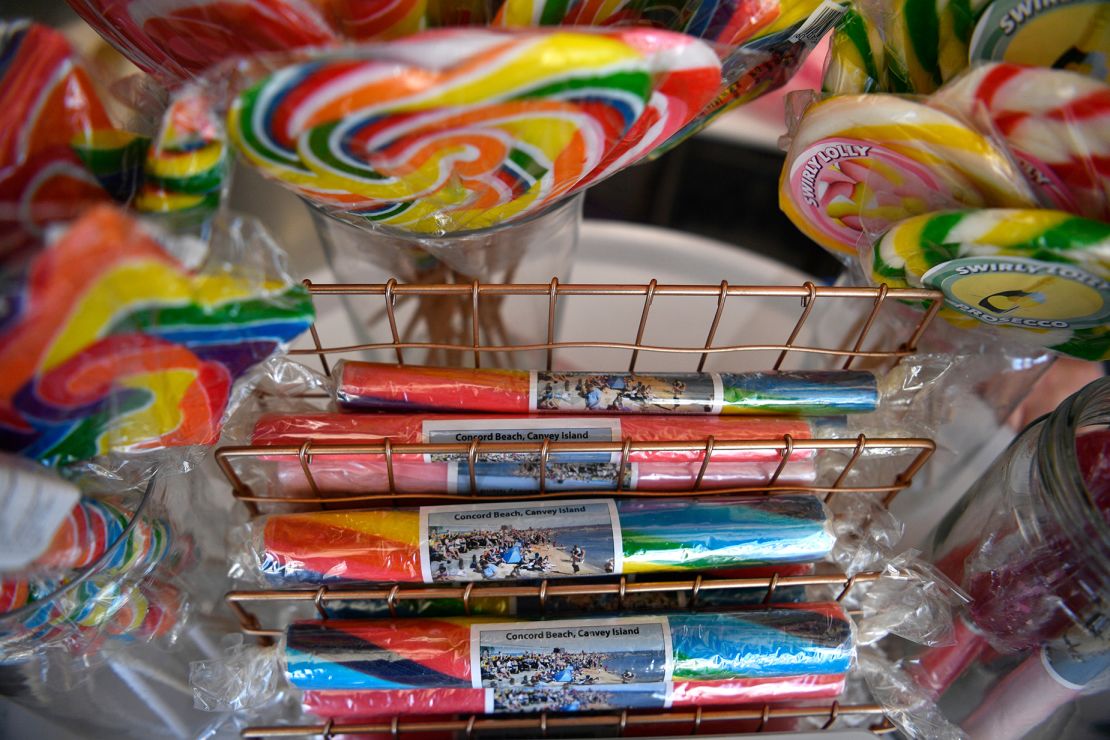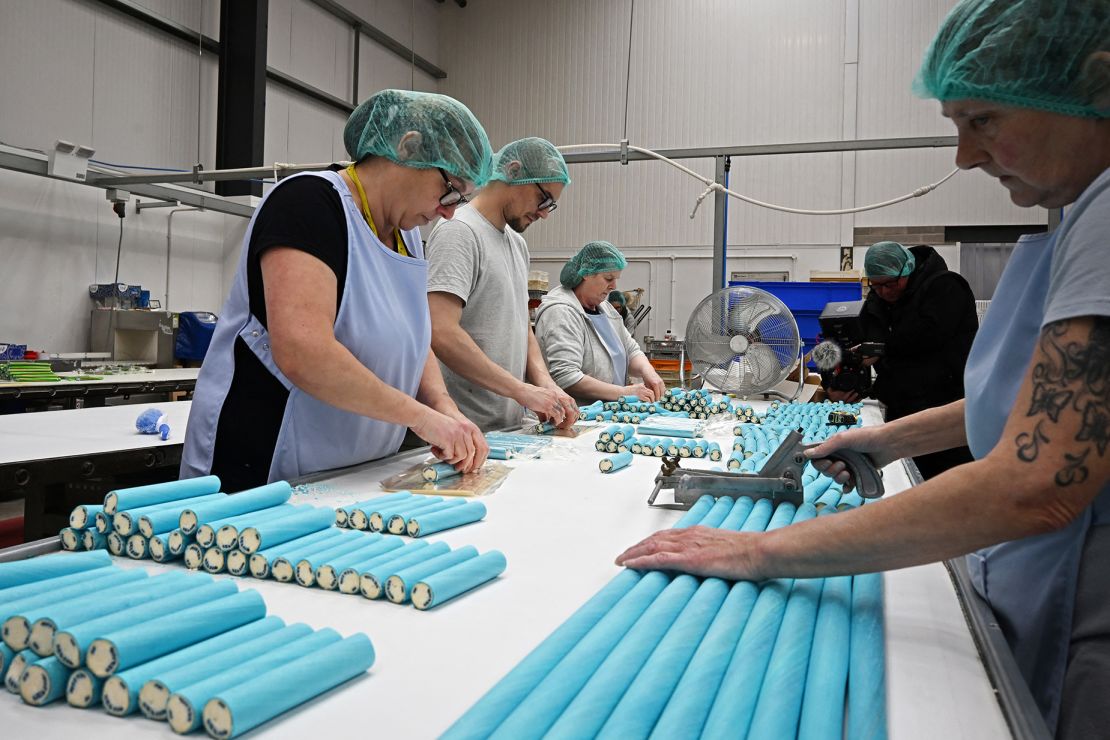For over 100 years, it has been a staple of the British seaside – one so classic that one of the best-known novels of the 20th century took its name from it.
But rock – a super-sweet hard candy shaped into long sticks, usually with the name of the resort “written” within – is looking under threat, as local manufacturers say that they are being put out of business by cheap imports.
Buying a stick of rock at the seaside has been a typical rite of passage for Brits ever since the candy first swept across the country in a sugary rush, which is thought to have been at the beginning of the 20th century or even a little earlier.
By 1938, when author Graham Greene wrote his novel “Brighton Rock” – which was named after the candy – he used the snack as a metaphor for morality. Protagonist Ida – a woman who was pursuing justice against a gang, alone – says that that people’s characters stay the same throughout their lives, just as the words in a stick of rock run the whole way through.
In fact, those famous letters in a piece of rock are handcrafted by artisans, usually in Blackpool, a seaside resort in Lancashire, northwest England.
Now the 10 remaining factories in the town say that the industry is at risk, with cheap rock imported from China threatening their business. Their owners have written to the government asking for the UK’s handmade rock to be given protected status – so that only the candy produced in the country can call itself “rock.”
“It’s a very, very recent problem,” David Thorp, director of Stanton & Novelty Confectioners, one of Blackpool’s 10 rock-makers who wrote the letter, told CNN. “We’ve always been aware of Chinese confectionery and we’ve even sold some ourselves, but it’s been weird and wonderful lollies (lollipops) or marshmallows. But when they started making sticks of rock was when we sat up and needed to do something.”
Stanton & Novelty make rock for around 150 seaside towns around the UK – with each town’s name embedded in the candy. Thorp’s grandfather started the business in 1969. “It was crazy busy back then – they couldn’t make enough, didn’t have enough hours in the day.”
Now, he says, they have had to diversify their offering, producing lollipops as well as rock, to stay afloat. Fourteen employees work at the factory, as well as Thorp’s parents. His father has worked there for 35 years.
When his grandfather started, there were over 30 rock factories in Blackpool alone. But, says Thorp, “Eight [factories] have closed in the last two or three years. I’d imagine two more may well close this year.”
The UK factories cannot compete on price. “Chinese rock is being sold for 12-15p ($0.15-$0.19) per stick, and we’re trying to compete but it’s unsustainable to do so, and becomes economically unviable,” he says.
Although Thorp says that Brexit isn’t a direct factor, he says that his cost of ingredients has gone up since the UK left the EU – as much of the sugar and glucose they use comes from continental Europe. The cost of living crisis in the UK, including soaring energy bills, has made it even harder.
Memories of childhood

For many Brits, a stick of rock is synonymous with childhood trips to the seaside.
“People relate it to childhood – whether that’s their own childhood, or their children’s, or their grandchildren’s,” says Thorp.
Of course, most Brits now prefer to hop on a budget airline for some European sun than head to a UK beach – but Thorp says that even with the change in vacation habits, it was still possible to make a living producing rock. “If you had a good summer, a nice Easter or a hot half-term holiday, you could always tell,” he says.
“I know holidays have changed but it gives people the nostalgia for family holidays.”
In Blackpool, making rock is real artisan work. Sugar and glucose are boiled with water, then laid on cold slabs to dry, as coloring is added.
While still soft, the different colored batches are “pulled” into strips, and then rolled into large cylinder shapes. Workers compose the letters by hand, using differently colored candy, while the cylinders are still in their original large form – almost the size of a forearm in diameter.
Workers then stretch and compress the cylinders of rock into the inch-thick sticks that go on sale – all by hand. It’s a job that requires expertise: at Promotional Candy – whose owner, Jason Evans, was another of the co-signees of the letter – the confectioners have a combined 80 years of experience.
Thorp says that the imported candy from China doesn’t have the lettering running through the rock, as the expertise is not there yet. But that doesn’t stop distributors and retailers stocking it over more expensive, locally produced candy.
“I get quite emotional thinking about [closing down] because we’ve been going for over 55 years,” he says. “This factory is my family’s identity. It’d be completely heartbreaking.”
‘We don’t stand a chance’

The business owners who have signed the letter want the government to protect the word “rock” or “rock stick” in the same way that the UK protects other food and drink: Cornish pasties, Scotch whisky, Wensleydale cheese and Melton Mowbray pork pies can only use these names if they are made in the place they name-check.
But rather than keeping it to Blackpool, the rock-makers want candy made anywhere in the UK to qualify, to allow more homegrown producers to take advantage.
“There are very few products that bring up the amount of nostalgia a stick of rock from the seaside does,” says Thorp. “It’s a sort of national heritage.”
Shipping in candy from China also has an environmental cost, he adds.
Anita McAleese, owner of McAdams Confectionery and another co-signer of the letter, told CNN that most consumers have no idea that the stick of candy they’re buying has been made in China.
“We don’t really stand a chance if there’s not public awareness,” she says.
McAleese’s husband started the business in 1995. “It was a thriving industry when we started – there were 18 factories in Blackpool and there was no competition between us because there was enough [business] to go around,” she says. Her 14 employees have slumped to just six since the imported rock started taking hold.
“t’s the retailers looking for the cheapest [option],” she says. “I had one distributor who was probably 50% of my work – and he has gone for the imported rock.”
Thorp says that if the homegrown industry goes under, “It’d be a massive shame.”
“Sticks of rock are over 100 years old, and a national treasure. It’s part of our shared culture,” he says.
“I’ll do anything to stop that happening.”





